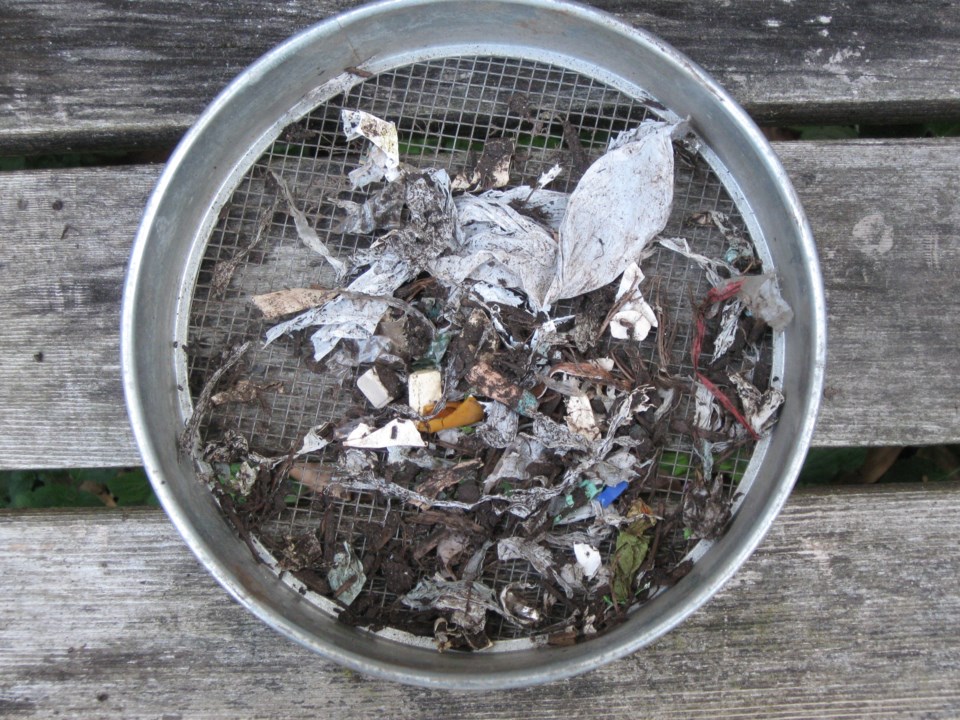A kind neighbour, who was laying out garden beds for the first time, got her soil from Kutny’s and included an extra cubic yard for me in her order. It was very good quality. When I’d finished adding it to my raised garden beds, I realized I actually could have used more and so went in search of soil at a few of the big box stores. Looking over the mountains of bags of garden soil piled up outside Canadian Tire and Home Depot made my head spin. The varieties seemed endless. Premium, professional, organic, all purpose – among a host of other tags – were used to describe the contents. What did they mean? The prices ranged from dirt-cheap to astronomical, but I wasn’t sure that the cost always indicated the quality of the soil.
Finally I went to Prickly Pear in Steveston and found they were selling a product called Power Top Soil. It was packaged for Canada Nurseryland, whose website seemed reassuring, so I bought a few bags. When I was about to empty the first one into a garden bed, I saw a couple of pieces of plastic, which made me decide to examine the entire 30-litre bag more closely. With every scoop of the trowel I found more plastic bits. The quantity shocked me. I removed as much as I could, and by the time the bag was empty, the bottom of my 7-inch sieve was almost completely covered with pieces of plastic, some rather large. I was scandalized.
Years ago I’d buy the excellent top soil produced at the Net Zero Waste Facility in Abbotsford. It was sold by Figaro’s Garden on Victoria Drive. But it turned out that the Abbotsford facility had been unable to provide them with any more soil this year because of flood damage in November 2021. When I checked the website of Net Zero Waste I discovered, to my great dismay, that at the end of 2020 the facility had been acquired by EverGen, and that it has now been found in breach of various provincial regulations according to the Environmental Management Act. I am deluded!
With this delusion and the discovery of plastic-infested soil being sold has come the awareness that the soil I already have in my yard, which has benefited from years of biodiversity and my tender loving care, is something extra special. I’m only slightly exaggerating when I say every grain is now carefully collected and saved – closer to the truth would be that every ped that comes from holes I’ve dug in the garden is saved for future use (ped refers to small aggregates of soil particles that bond together; in the ground individual peds are separated by voids for the movement of air, water and roots).
My recommendation is to cultivate your own soil. Turn as much of your lawn as possible into garden beds. Add your own compost. Mulch the beds – dried leaves are ideal, especially the thinner, smaller leaves such as those from birch, maple or linden trees, and they decompose faster if you can shred them, either with a leaf shredder or with your lawn mower. The mulch will help keep the soil from drying out and will eventually enrich it with organic matter. You can also plant cover crops in your garden beds. Phacelia and buckwheat are my favourites, not least of all because they make beautiful flowers.
It may not always be buried treasure that we find in the ground, but if we manage not to find any plastic we can already feel gratified.
Sabine Eiche is a local writer and art historian with a PhD from Princeton University. She is passionately involved in preserving the environment and protecting nature. Her columns deal with a broad range of topics and often include the history (etymology) of words in order to shed extra light on the subject.



